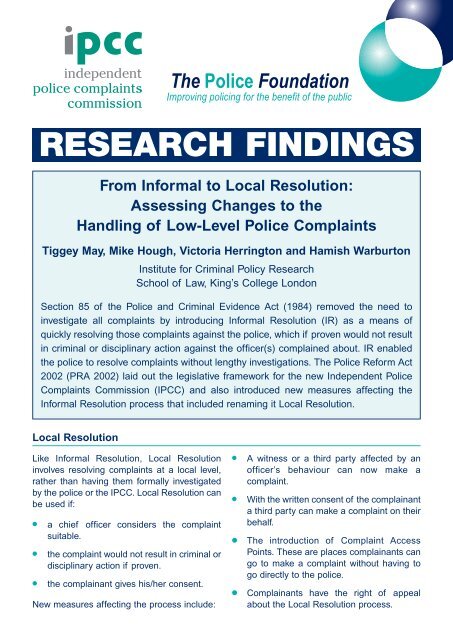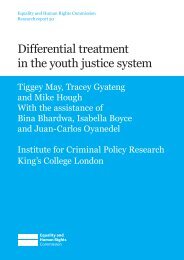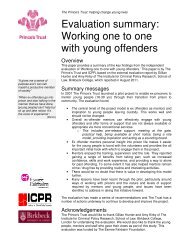Key findings - Independent Police Complaints Commission
Key findings - Independent Police Complaints Commission
Key findings - Independent Police Complaints Commission
You also want an ePaper? Increase the reach of your titles
YUMPU automatically turns print PDFs into web optimized ePapers that Google loves.
RESEARCH FINDINGSFrom Informal to Local Resolution:Assessing Changes to theHandling of Low-Level <strong>Police</strong> <strong>Complaints</strong>Tiggey May, Mike Hough, Victoria Herrington and Hamish WarburtonInstitute for Criminal Policy ResearchSchool of Law, King’s College LondonSection 85 of the <strong>Police</strong> and Criminal Evidence Act (1984) removed the need toinvestigate all complaints by introducing Informal Resolution (IR) as a means ofquickly resolving those complaints against the police, which if proven would not resultin criminal or disciplinary action against the officer(s) complained about. IR enabledthe police to resolve complaints without lengthy investigations. The <strong>Police</strong> Reform Act2002 (PRA 2002) laid out the legislative framework for the new <strong>Independent</strong> <strong>Police</strong><strong>Complaints</strong> <strong>Commission</strong> (IPCC) and also introduced new measures affecting theInformal Resolution process that included renaming it Local Resolution.Local ResolutionLike Informal Resolution, Local Resolutioninvolves resolving complaints at a local level,rather than having them formally investigatedby the police or the IPCC. Local Resolution canbe used if:● a chief officer considers the complaintsuitable.●●the complaint would not result in criminal ordisciplinary action if proven.the complainant gives his/her consent.New measures affecting the process include:●●A witness or a third party affected by anofficer’s behaviour can now make acomplaint.With the written consent of the complainanta third party can make a complaint on theirbehalf.● The introduction of Complaint AccessPoints. These are places complainants cango to make a complaint without having togo directly to the police.● Complainants have the right of appealabout the Local Resolution process.
The ResearchThe report presents the results of a survey ofProfessional Standards Departments (PSDs)in England and Wales. The survey carriedout in mid 2005 was similar to a previoussurvey about the Informal Resolutionprocess (Warburton et al., 2003). The 2005survey quantified the extent of change fromInformal to Local Resolution and the variationin the use of Local Resolution across forcesin England and Wales.<strong>Key</strong> <strong>findings</strong>:●●●●●●Half the forces used Divisional officers toprovide support and advice to thoseconducting Local Resolution.The practice of ‘desktop resolution’ (wherecomplaints are dealt with without beingrecorded) continues.Use of mediation remains limited.The appeals process was seen as havingthe potential to improve complainantsatisfaction and internal monitoring.There was widespread agreement that thenew system was simpler and moretransparent, resulting in improvedcomplainant satisfaction.Few forces felt that officer understandingor satisfaction with the process hadimproved.● A number of forces would supportmandatory Local Resolution for certaincomplaints, thus removing thecomplainant’s right to opt for a fullinvestigation.● Building particular communities’confidence in the complaints system;●●Building police confidence;Looking at training needs;● Using imaginative ways to resolvecomplaints.The research <strong>findings</strong>, and subsequent actionpoints, are framed around these five areas.Building complainants’ confidencein the Local Resolution processPSDs and successive oversight bodies haveattempted to improve complainantconfidence in the complaints system for anumber of years, however, research hasshown that despite reforms and initiatives,complainant satisfaction has remained low.Since the introduction of Local Resolutionseveral forces reported that they hadimplemented ‘complainant contracts’ toimprove complainant satisfaction. Someforces reported using designated divisionalofficers to provide support and advice toofficers conducting Local Resolution andothers said they were attempting to improvedivisional expertise by providing LocalResolution training for a selection of officers.Action pointTo gauge the relative merits of any newapproach regional IPCC offices shouldencourage force PSDs to include an elementof self-monitoring.The IPCC guidance states that for LocalResolution to work, the police service needsto concentrate on the following areas:●Building complainants’ confidence in thecomplaints system;Building particularcommunities’ confidenceAt the time of the survey, most forces hadintroduced measures to improve complainantaccess to the complaints system. In a number
of forces complaints against the police cannow be made by a third party, as long as theyhave the written permission of thecomplainant. In other forces, independentorganisations can now guide complainantsthrough the process.Action pointTo engage hard to reach groups in thecomplaints system, forces should continue towork with community organisations, use arange of methods to resolve complaints andmonitor their progress.Using imaginative waysof settling complaintsA number of forces reported that they hadintroduced innovations since 2004. Threeforces had introduced briefings withcommunity groups to explain the LocalResolution process and another force waspiloting the use of an independentorganisation to assist complainants whosefirst language was not English, or who feltuncomfortable making a complaint at a policestation. In a number of forces mediationmeetings were being used. These meetingswere perceived by PSDs to have the potentialto improve the process for both complainantsand officers by increasing transparency andawareness, and by providing an atmosphereconducive to learning.Action pointTo develop successful innovations, it isimportant to monitor their effectiveness,including how far they meet the needs ofcomplainants and officers. PSDs shouldcapture ideas and feedback and feed theminto regional PSD and IPCC meetings.Building police confidence andaddressing training needsMany forces highlighted the need to improveofficer confidence in and training on thecomplaints process. Less than half felt themove from Informal to Local Resolution hadbenefited officers; most considered officersatisfaction to be poor. A contributing factorwas seen to be the lack of communicationbetween PSDs and officers subject to acomplaint; improving this aspect wasconsidered an important step towardsimproving officer confidence. Although overtwo-thirds of forces said they providedtraining for officers of all ranks, one third saidthe lack of suitably trained divisional staffwas a problem.Action pointTo improve understanding and raise officers’confidence in the process, PCs could receivetraining on Local Resolution at briefingsessions or via the <strong>Police</strong> Federation.Supervisors should also be trained tomanage the process. Support from localmanagement and PSDs is essential fortraining to be successful.Recommendations for the IPCCWhilst it is impossible to monitor all LocalResolutions across 43 forces, the IPCC needa reliable and accurate data system capableof capturing the diversity of practice at alocal level in order to provide effectiveoversight. This system should be periodicallyevaluated to ensure it is effective. Developinga system equivalent to the National CrimeRecording Standard for the complaintssystem could be an option. The IPCC shouldaddress the continuing practice of ‘desktopresolution’.June 2007
The <strong>Police</strong> Foundation is the only independent charitable organisation focussed entirely on developingknowledge and understanding of policing and challenging the police service and government to improvepolicing for the benefit of the public. The <strong>Police</strong> Foundation is a bridge between the police service,the government and the public, while being owned by none of them. Find out more about us atwww.police-foundation.org.ukThe <strong>Independent</strong> <strong>Police</strong> <strong>Complaints</strong> <strong>Commission</strong> is the independent organisation with the job ofmaking sure that complaints against the police are dealt with effectively. We set standards for the way thepolice handle complaints and, when something has gone wrong, we help the police learn lessons andimprove the way they work. Find out more about us at www.ipcc.gov.ukTiggey May is a Senior Research Fellow at the Institute for Criminal Policy Research, King’s CollegeLondon, where Mike Hough is Director and Professor of Criminal Policy.The Institute for Criminal Policy Research carries out multi-disciplinary research into crime and thecriminal justice system. The Institute produces work which is independent, and objective and of thehighest technical quality.This is the second of three reports on the resolution of low level complaints against thepolice. This research was conducted on behalf of The <strong>Police</strong> Foundation and the<strong>Independent</strong> <strong>Police</strong> <strong>Complaints</strong> <strong>Commission</strong> and funded by the Big Lottery Fund andthe <strong>Independent</strong> <strong>Police</strong> <strong>Complaints</strong> <strong>Commission</strong>.© <strong>Police</strong> Foundation 2003ISBN 0 947692 38 X© <strong>Police</strong> Foundation/IPCC 2007ISBN 0 947692 43 6© <strong>Police</strong> Foundation/IPCC 2007ISBN 0 947692 44 4<strong>Independent</strong> <strong>Police</strong> <strong>Complaints</strong> <strong>Commission</strong>90 High HolbornLondon WC1V 6BHTel: 08452 002 002e-mail: enquiries@ipcc.gsi.gov.ukwww.ipcc.gov.ukThe <strong>Police</strong> FoundationFirst Floor, Park Place,12 Lawn Lane, London SW8 1UDTel: 020 7582 3744e-mail: sue.roberts@police-foundation.org.ukwww.police-foundation.org.uk






